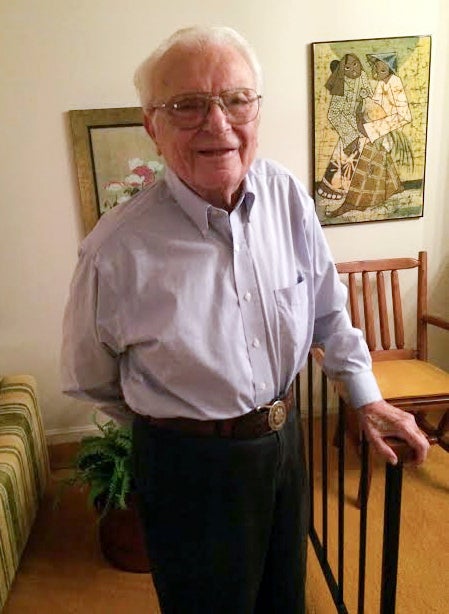Longtime AP Pentagon reporter Fred Hoffman, who was lauded for his Vietnam coverage, dies at 100
Fred S

Your support helps us to tell the story
From reproductive rights to climate change to Big Tech, The Independent is on the ground when the story is developing. Whether it's investigating the financials of Elon Musk's pro-Trump PAC or producing our latest documentary, 'The A Word', which shines a light on the American women fighting for reproductive rights, we know how important it is to parse out the facts from the messaging.
At such a critical moment in US history, we need reporters on the ground. Your donation allows us to keep sending journalists to speak to both sides of the story.
The Independent is trusted by Americans across the entire political spectrum. And unlike many other quality news outlets, we choose not to lock Americans out of our reporting and analysis with paywalls. We believe quality journalism should be available to everyone, paid for by those who can afford it.
Your support makes all the difference.Fred S. Hoffman, a longtime Associated Press reporter who covered the Defense Department for more than two decades and was a Pulitzer Prize finalist for an investigation into the black market in Vietnam has died. Hoffman was 100.
Well known within the Pentagon, Hoffman was recalled as a tough, enterprising, ethical and tireless reporter who spent nearly 40 years in the news business, including 36 with the AP. After retiring from the AP, he served as the chief spokesman and policy adviser to Defense Secretary Caspar Weinberger.
According to his daughter Lisa Hoffman, he died of melanoma at at his home in Alexandria, Virginia, on June 24. She said he “always marveled at his lifelong good luck and left at peace, with no regrets.”
Hoffman began his career as a radio reporter in Boston covering boxing matches from the front row, dodging flying droplets of blood. After moving on to the AP, he covered seven administrations, including extensive time in Vietnam covering the war. He and Hugh Mulligan were named finalists for the Pulitzer Prize for their series of stories on profiteering and corruption in South Vietnam, revealing that hundreds of millions of U.S. taxpayer dollars were going down the drain in theft, bribery, waste and money manipulation.
“He was a giant among Pentagon reporters. Truly a legend,” said Robert Burns, a retired AP national security correspondent.
On Monday, Lisa Hoffman said that as she was going through his things, she found some of the many letters he wrote to her from the war. When he retired, he gave boxes of his reporting files to the National Defense University for research.
Reflecting on his career, she said, “He really loved it, and I loved it through him.”
Lisa, who also covered the Pentagon as a reporter for Scripps Howard News Service, said she learned the tradecraft of journalism by listening to her dad at dinner, and the stories he would tell.
“I don’t think some people knew about how good he was at reading things upside down,” Hoffman said. “He’d be chatting with some official and they’d have something on their desk, and he’d read it, memorize it and have a good story.”
She said his "guiding principle was ‘go there.’ Don’t sit at your desk or wait for the phone calls or make phone calls. Go, hit the hallways and make the rounds and talk to people in person.”
Hoffman was also highly protective of his sources, keeping a little notebook of phone numbers — but no names, she said. He’d memorized the names, and in his desk files inside the Pentagon, he’d take care to remove any marks indicating a source. More than once, Hoffman said, her dad went into the Pentagon to work weekends and found officials going through his files.
“He was so, so adept at hiding them that he never blew a source,” she said.
Bill Greener, deputy press secretary to President Gerald Ford during the high-tension 1975 Mayaguez incident, recalled that Hoffman filed his story on the seizing of the ship “faster than we could get the information to the president of the United States.”
Among his other awards were commendations from the Overseas Press Club; the National Headliners Club; the VFW’s first Gold Medal for national security reporting; and the Department of Defense medal for distinguished public service.
The Pentagon award recognized his service as Weinberger's spokesman. He served in that role for four years and spearheaded reforms of the press pool system to ensure journalists could get to the front lines quickly.
Hoffman was born on Dec. 26, 1922, in Dorchester, Mass. His mother, Rachel Gold, had fled Poland, arriving in America alone in steerage at age 13, with her mother’s Sabbath candlesticks and little else in her bag. His father, Louis, worked as a paper hanger. Hoffman studied journalism for three years at Boston University, and served as an Army reservist during World War II.
He was married to Norma Simons for 72 years, until her death in 2017.
In addition to his daughter, survivors include step-grandchildren Aida and Mirza Dedajic. His brother, Morris Hoffman, died in 1928 and sister, Doris Kroner, in 2003.
Burial will occur at a later date at Arlington National Cemetery.